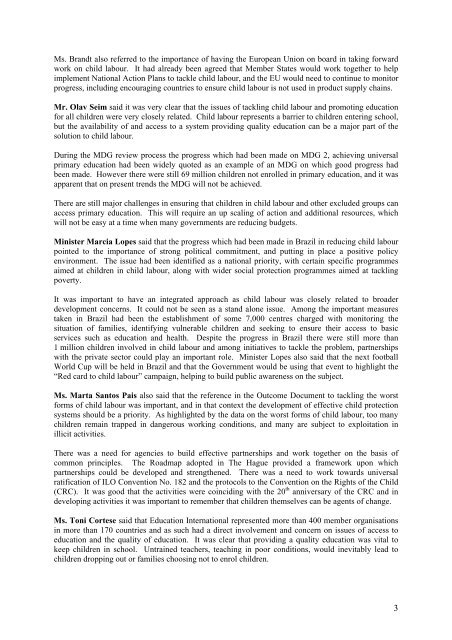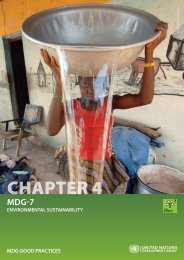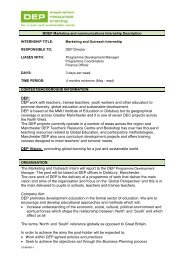Tackling Child Labour - Development Education Project
Tackling Child Labour - Development Education Project
Tackling Child Labour - Development Education Project
You also want an ePaper? Increase the reach of your titles
YUMPU automatically turns print PDFs into web optimized ePapers that Google loves.
Ms. Brandt also referred to the importance of having the European Union on board in taking forward<br />
work on child labour. It had already been agreed that Member States would work together to help<br />
implement National Action Plans to tackle child labour, and the EU would need to continue to monitor<br />
progress, including encouraging countries to ensure child labour is not used in product supply chains.<br />
Mr. Olav Seim said it was very clear that the issues of tackling child labour and promoting education<br />
for all children were very closely related. <strong>Child</strong> labour represents a barrier to children entering school,<br />
but the availability of and access to a system providing quality education can be a major part of the<br />
solution to child labour.<br />
During the MDG review process the progress which had been made on MDG 2, achieving universal<br />
primary education had been widely quoted as an example of an MDG on which good progress had<br />
been made. However there were still 69 million children not enrolled in primary education, and it was<br />
apparent that on present trends the MDG will not be achieved.<br />
There are still major challenges in ensuring that children in child labour and other excluded groups can<br />
access primary education. This will require an up scaling of action and additional resources, which<br />
will not be easy at a time when many governments are reducing budgets.<br />
Minister Marcia Lopes said that the progress which had been made in Brazil in reducing child labour<br />
pointed to the importance of strong political commitment, and putting in place a positive policy<br />
environment. The issue had been identified as a national priority, with certain specific programmes<br />
aimed at children in child labour, along with wider social protection programmes aimed at tackling<br />
poverty.<br />
It was important to have an integrated approach as child labour was closely related to broader<br />
development concerns. It could not be seen as a stand alone issue. Among the important measures<br />
taken in Brazil had been the establishment of some 7,000 centres charged with monitoring the<br />
situation of families, identifying vulnerable children and seeking to ensure their access to basic<br />
services such as education and health. Despite the progress in Brazil there were still more than<br />
1 million children involved in child labour and among initiatives to tackle the problem, partnerships<br />
with the private sector could play an important role. Minister Lopes also said that the next football<br />
World Cup will be held in Brazil and that the Government would be using that event to highlight the<br />
“Red card to child labour” campaign, helping to build public awareness on the subject.<br />
Ms. Marta Santos Pais also said that the reference in the Outcome Document to tackling the worst<br />
forms of child labour was important, and in that context the development of effective child protection<br />
systems should be a priority. As highlighted by the data on the worst forms of child labour, too many<br />
children remain trapped in dangerous working conditions, and many are subject to exploitation in<br />
illicit activities.<br />
There was a need for agencies to build effective partnerships and work together on the basis of<br />
common principles. The Roadmap adopted in The Hague provided a framework upon which<br />
partnerships could be developed and strengthened. There was a need to work towards universal<br />
ratification of ILO Convention No. 182 and the protocols to the Convention on the Rights of the <strong>Child</strong><br />
(CRC). It was good that the activities were coinciding with the 20 th anniversary of the CRC and in<br />
developing activities it was important to remember that children themselves can be agents of change.<br />
Ms. Toni Cortese said that <strong>Education</strong> International represented more than 400 member organisations<br />
in more than 170 countries and as such had a direct involvement and concern on issues of access to<br />
education and the quality of education. It was clear that providing a quality education was vital to<br />
keep children in school. Untrained teachers, teaching in poor conditions, would inevitably lead to<br />
children dropping out or families choosing not to enrol children.<br />
3








